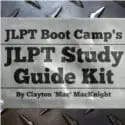The hot, sweaty, humid days of summer are almost over. We just have to make it through the typhoon season and we are into probably the best season in Japan, fall. Time for barbecues and hikes and getting out of the house before we have to hide out again in winter.
I hope I can get out of the house as much I can. I’ll most likely be incredibly busy over the next few months though. Now that I have my results back from the July test, I have a general idea of what I need to work on in order to bring my score up enough to pass the test in December.
Moving Away from Lists
I think when you first start studying for a particular level, it is important to devote a good chunk of time to learning the new vocabulary. I usually try to go through the lists for the particular level as much as I can to start off, learning as much of the new vocabulary as I can. But, there comes a point where you can do too much ‘list-studying’.
I feel like I’ve reached that point. When I was taking the test, I knew the vocabulary pretty well. I could recognize most the words on the test and there weren’t too many words that I drew a blank on. There were plenty of words that I was a little foggy about, but I had still seen before. But for the most part I had a vague understanding of most of the words.
But when it came to gluing all those words together to form a complete thought, I was a little stumped. I couldn’t really comprehend a lot of the passages and make a summary of the ideas. This is part grammar problem and part phrasing problem. I’ll be working hard to try to build up my skeleton making skills over the next few months.
Building Comprehension
In addition to hitting the reading drill books hard, I’ll be reviewing a lot of the listening I did in July and August. I’ll be walking back through a lot of the listening in order to build up my comprehension skills for both reading and listening. I personally think listening is one of the easiest things to study for because it is so portable these days.
Reading is going to be more difficult though. In order to review reading you generally have to be sitting down and in a relatively quiet room. Even studying on the train can be a bit difficult at times, but I’ll try to squeeze in as much practice as I can, and pouring back over difficult passages to extract the vocabulary and phrasing.
Keep it Fun
This is probably the most important thing to concentrate on for me! I have an incredibly busy and hectic schedule and it will be very easy to burn out while studying, blogging, podcasting, working, and raising the little one. So, I also recognize the need to keep it light.
I’ll be finishing off Harry Potter here pretty soon, I hope by the end of next month, but it might take a little longer. Right now I’m currently on page 350 of 457, so it will be close. It has become a real fun book to read after the initial hurdle of difficult vocabulary.
After I finish off Harry Potter, I’ll be moving on to a book about buying houses in Japan. Yes, that’s right, I’m keeping it fun by reading about real estate, but I’m thinking about buying a house sometime next year I need to do the research. Anyway, it is exciting to go house shopping, even if it is a little complicated.
High Speed Reading Update
Another thing that I’m going to practice a little bit during my reading months is to increase my reading speed. I have a pretty good speed, but I’d like to crank it up a little faster so that I have time to do the test than go back and double-check or adjust answers.
I recently accidentally discovered a new technique of how to force yourself to read faster. It is a method using audio to force yourself to read faster. I’ve started to use it and it has helped to train my mind to focus on the reading so that I can increase my speed.
I go over step by step how to do it in a new update to the JLPT Study Guide Kit. You can do it with simple, free-to-use tools that will accelerate your reading speed effortlessly. If you haven’t picked up the kit yet, you can find out all the details at the premium site.
What’s your game plan?
What are you planning for these final 3 months before the exam? Did you take the July test? Did you change your plan? Let me know in the comments below.
Podcast: Play in new window | Download (Duration: 13:52 — 12.7MB)
Subscribe: RSS













Is the reading technique the accelerated reading one in the last update or is there a new update soon?
This reading technique is in the 1.1 update. I’ll be rolling out a new update pretty soon though, (hopefully this weekend), so stay tuned.
I got quite anxious when preparing for the N3 test this summer because I wasn’t sure what I had to memorise. In the end the test went quite well, because I’d already reached an appropriate level of comprehension in general to pass the test. I remember in particular with the vocabulary section, a number of the words being tested were not words I remembered from any list I’d studied from, but I knew the answers anyway because they were common words that had cropped up in conversations, TV or books. The one thing I eventually realised was that the kanji, vocab and grammar sections of the test are three sections of only one third of the test paper. If your overall score is 1/3 technical knowledge and 2/3 comprehension, it makes sense to weigh things much more towards comprehension. The other scary thing with the reading paper in particular is that you get a lot of marks for a relatively small number of questions, so you can’t afford to make too many mistakes.
My approach to N3 work was very much lists first and comprehension later. I’ve really turned things on their head now that I’m preparing for the N2. The whole foundation of my study approach is built around the reading section. I aim to study 1 reading practice question a day, 5 days a week, from the New Kanzen Master Reading Book. The passages are quite short so I can usually fit this into half an hour or so. I make sure that not only can I answer the question, but I also understand everything in the text, including the building blocks of kanji, vocabulary and sentence patterns, but also how they build together to make a coherent argument. The example questions in the book also have lots of valuable information about the kind of devices used to make an argument, such as comparisons and rephrasing. I’m finding it much easier and more interesting to learn vocab and grammar within the context of a short text, but this approach is also turning out to be so useful for developing my comprehension in general, I think I’d continue doing it whether I was preparing for a test or not.
I’ll have to wait until December to see if this approach works for the exam, however!
Yeah, generally speaking comprehension is a lot better method than just chewing through list after list of grammar and vocabulary. The only issue I’ve found with this is sometimes when you get to a new level I found myself looking up a ton of vocabulary when doing the reading passages which made them a complete bore to get through, so I try to pack in just enough vocabulary before setting about doing reading. I also try to at least have an understanding of all the grammar before I start on it as well.
There are some teachers that swear by extensive reading, which is the practice of reading a lot of books at your level to learn grammar and vocabulary of language with. I think this makes pretty good sense, but there a few tricky points that are worth focusing on in order to prepare you for all possible scenarios.
Anyway sounds like you are on the right path to pass N2. Good luck with your studies!